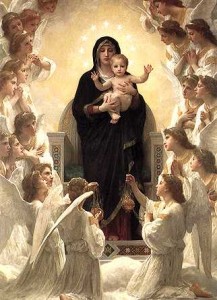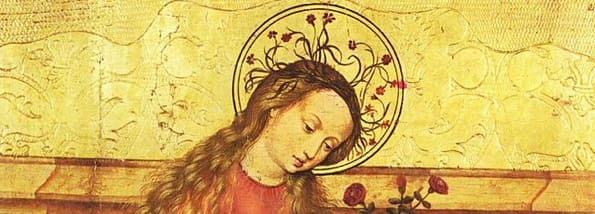 Dear Father John, I am a convert to the Catholic faith, and I still have difficulties with Mary. Don’t get me wrong – I believe all the dogma and doctrine fully, but when it comes to praying to Mary, I don’t seem to get it. What role is she supposed to have in my pursuit of holiness and spiritual growth?
Dear Father John, I am a convert to the Catholic faith, and I still have difficulties with Mary. Don’t get me wrong – I believe all the dogma and doctrine fully, but when it comes to praying to Mary, I don’t seem to get it. What role is she supposed to have in my pursuit of holiness and spiritual growth?
This is a great question for the month of August, with the Solemnity of Mary’s Assumption right around the corner. As a fellow convert, I think I know what you mean. Marian devotion (this refers to what you mention about the “role she is supposed to have in my pursuit of holiness”) flows from Marian doctrine, from what the Church teaches about Mary’s role in God’s plan of salvation. The core of that doctrine is, as you can imagine, Jesus Christ. Mary is important because Jesus is important. Let’s take a look at the doctrinal issue before we move into specifics of Marian devotion.
Avoiding Exaggerations
Non-Catholic Christians often accuse Catholics of idolizing the Blessed Virgin Mary, of treating her like a goddess instead of a creation of God. Undoubtedly, some Catholics have had, and still have, an exaggerated devotion to Mary. But the Church’s official teaching has consistently steered clear of exaggeration. The Second Vatican Council points out that devotion to Mary “as it has always existed in the Church, for all its uniqueness, differs essentially from the cult of adoration,” (Lumen Gentium, 66) which is offered to God alone, Father, Son, and Holy Spirit. In other words, Catholics don’t worship Mary; we worship God. Anyone worshiping Mary, treating her as if she were divine, would not be following Catholic practice.
Most Catholics in modern America, however, tend to exaggerate Marian devotion in the other direction: giving it too little attention instead of too much. Vatican II also pointed this out, when it warned theologians and preachers to “refrain as much from all false exaggeration as from too summary an attitude in considering the special dignity of the Mother of God” (Lumen Gentium, 67).
Mary’s Unique Role: God’s Choice
Mary is not just another run-of-the-mill Christian. She was not just some kind of surrogate mother that God rented out for nine months and then forgot about. Not at all.
God could have chosen to send us a Savior in a thousand different ways. He could have sent him to earth on a chariot of fire descending from the night sky, or formed him from the dust of the ground as he had formed Adam. He could have. But he didn’t. He chose to come to us, to bring us eternal life, to redeem the fallen world, through a woman. He chose to be incarnate, to become a zygote, an embryo, a fetus and a baby in a mother’s womb.
That fact, recorded in the Gospels, is the secret to understanding everything that the Church teaches about the Mary: God chose to send Christ into the world through Mary’s free and conscious collaboration. He didn’t have to, he chose to. And all of Mary’s special privileges – her Immaculate Conception, her Assumption into heaven, and her perpetual virginity – flow from that choice.
Christ Stays at the Center
But why did God choose to send us our Savior in this way? The Church points to a certain appropriateness in having a woman, a mother, collaborate so closely in the redemption of the world. After all, the original plan of God for mankind was disrupted through the disobedience of both Adam and Eve: together they had been entrusted with a mission that together they messed up. It is fitting, then, that Christ, the new Adam, should involve Mary, the new Eve, so intricately in his plan of redemption. As St. Irenaeus, writing in the second century, put it, “the knot of Eve’s disobedience was untied by Mary’s obedience.”
The Second Vatican Council puts it beautifully when describing the angel’s annunciation to the Virgin Mary: “The Father of mercies willed that the Incarnation should be preceded by assent on the part of the predestined mother, so that just as a woman had a share in bringing about death, so also a woman should contribute to life” (Lumen Gentium, 56).
When we were baptized, we became Christ’s brothers and sisters, as well as members of his body (the Church), and so Mary’s maternal care for Christ was extended to us as well. Responding to that care, accepting it and utilizing it to help us follow Christ more closely, is the heart of Marian devotion. The proud and self-willed child wants to do everything himself; the humble and wise child allows his mother to teach, guide, and inspire him. Mary wants to do that for us in three ways. We will look at them one-by-one in the next post.
Yours in Christ, Father John Bartunek, LC
+
Art for this post on a Convert Struggling with Praying to Mary: Regina Angelorum (The Queen of the Angels), William-Adolphe Bouguereau, 1900, PD-US published in the U.S. prior to January 1, 1923, Wikimedia Commons.


